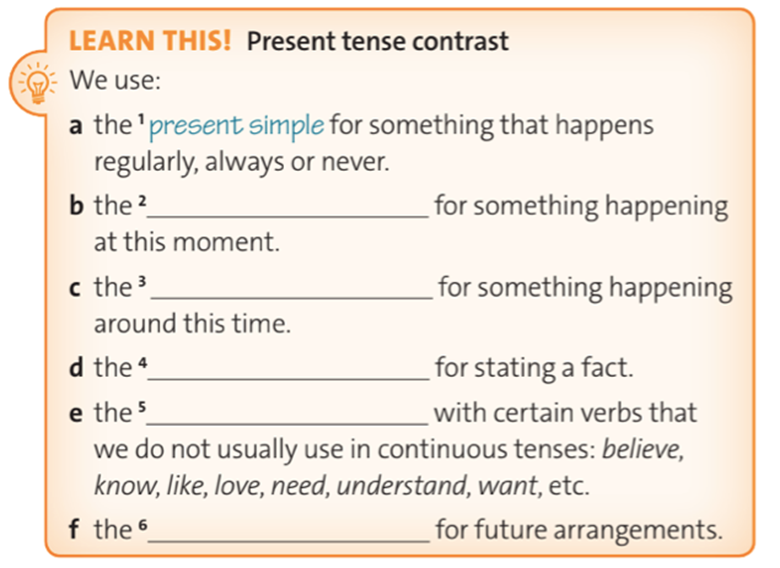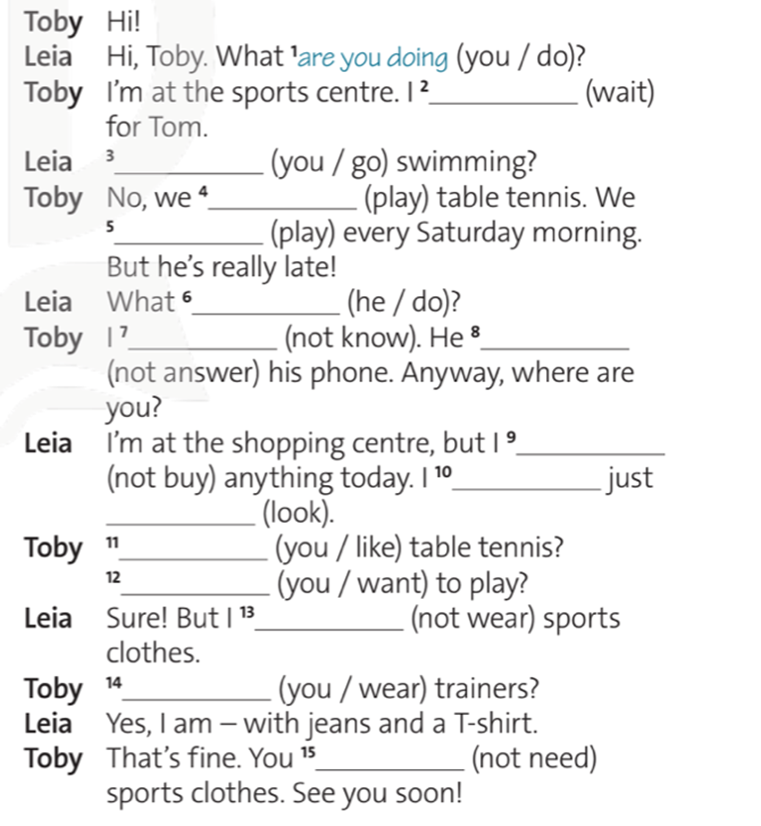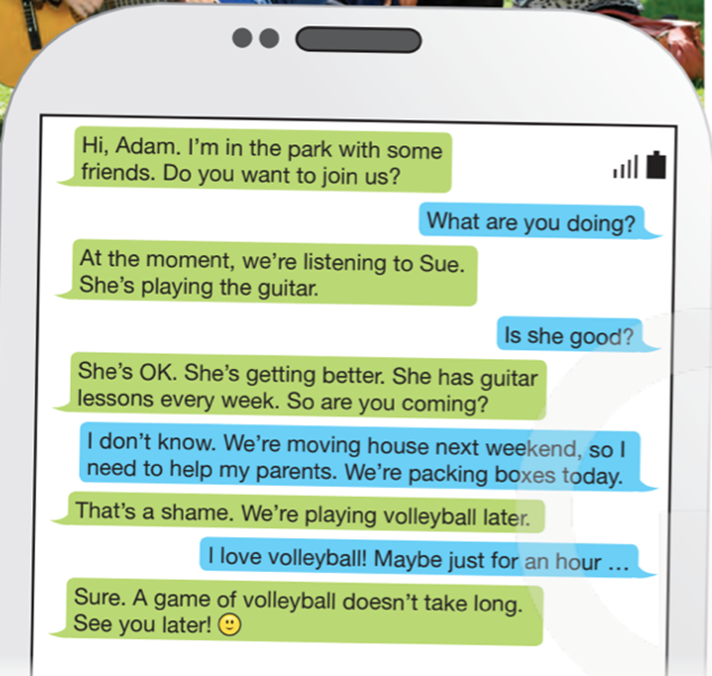Câu hỏi:
22/07/2024 122
Find the examples of the present simple and the present continuous in the messages in exercise 2. Then read the Learn this! box and complete the rules. (Tìm các ví dụ cho thì hiện tại đơn và thì hiện tại tiếp diễn trong đoạn tin nhắn ở bài 2. Sau đó đọc bảng Learn this và hoàn thành phần quy tắc)

Find the examples of the present simple and the present continuous in the messages in exercise 2. Then read the Learn this! box and complete the rules. (Tìm các ví dụ cho thì hiện tại đơn và thì hiện tại tiếp diễn trong đoạn tin nhắn ở bài 2. Sau đó đọc bảng Learn this và hoàn thành phần quy tắc)

Trả lời:
 Giải bởi Vietjack
Giải bởi Vietjack
Hướng dẫn dịch:
Chúng ta dùng:
a. thì hiện tại đơn diễn tả hành động xảy ra thường xuyên, luôn luôn hoặc không bao giờ.
b. thì hiện tại tiếp diễn diễn tả hành động xảy ra ngay tại thời điểm nói.
c. thì hiện tại tiếp diễn diễn tả hành động xảy ra xung quanh thời điểm nói.
d. thì hiện tại đơn diễn tả một sự thật.
e. thì hiện tại đơn khi đi với các động từ không dùng ở tiếp diễn: believe (tin tưởng), know (biết), like (thích), love (yêu), need (cần), understand (hiểu), want (muốn), vân vân…
f. thì hiện tại tiếp diễn diễn tả các kế hoạch trong tương lai.
Thì hiện tại đơn:
- Do you want to join us?
- She has guitar lesson every week.
- I don’t know.
- I need to help my parents.
- I love volleyball.
- A game of volleyball doén’t take long.
Thì hiện tại tiếp diễn
- I’m in the park with some friends.
- What are you doing?
- At the moment, we’re listening to Sue.
- Are you coming?
- She’s playing the guitar.
- We’re moving house next weekend.
- We’re packing boxes today.
- We’re playing volleyball later.
Đáp án
1. present simple
2. present continuous
3. present continuous
4. present simple
5. present simple
6. present continuous
Hướng dẫn dịch:
Chúng ta dùng:
a. thì hiện tại đơn diễn tả hành động xảy ra thường xuyên, luôn luôn hoặc không bao giờ.
b. thì hiện tại tiếp diễn diễn tả hành động xảy ra ngay tại thời điểm nói.
c. thì hiện tại tiếp diễn diễn tả hành động xảy ra xung quanh thời điểm nói.
d. thì hiện tại đơn diễn tả một sự thật.
e. thì hiện tại đơn khi đi với các động từ không dùng ở tiếp diễn: believe (tin tưởng), know (biết), like (thích), love (yêu), need (cần), understand (hiểu), want (muốn), vân vân…
f. thì hiện tại tiếp diễn diễn tả các kế hoạch trong tương lai.
Thì hiện tại đơn:
- Do you want to join us?
- She has guitar lesson every week.
- I don’t know.
- I need to help my parents.
- I love volleyball.
- A game of volleyball doén’t take long.
Thì hiện tại tiếp diễn
- I’m in the park with some friends.
- What are you doing?
- At the moment, we’re listening to Sue.
- Are you coming?
- She’s playing the guitar.
- We’re moving house next weekend.
- We’re packing boxes today.
- We’re playing volleyball later.
Đáp án
1. present simple
2. present continuous
3. present continuous
4. present simple
5. present simple
6. present continuous
CÂU HỎI HOT CÙNG CHỦ ĐỀ
Câu 1:
Complete the phone dialogue. Use the correct present simple or present continuous form of the verbs in brackets. Then listen and check. (Hoàn thành đoạn hội thoại qua điện thoại. Sử dụng dạng đúng của động từ ở thì hiện tại đơn và hiện tại tiếp diễn. Nghe và kiểm tra lại)

Complete the phone dialogue. Use the correct present simple or present continuous form of the verbs in brackets. Then listen and check. (Hoàn thành đoạn hội thoại qua điện thoại. Sử dụng dạng đúng của động từ ở thì hiện tại đơn và hiện tại tiếp diễn. Nghe và kiểm tra lại)

Câu 2:
Speaking. Describe the photo. What are the people doing? Use the verbs below. (Nói: Miêu tả bức tranh. Mọi người đang làm gì? Sử dụng các động từ dưới đây)
laugh
play
sit
smile
wear

Speaking. Describe the photo. What are the people doing? Use the verbs below. (Nói: Miêu tả bức tranh. Mọi người đang làm gì? Sử dụng các động từ dưới đây)
laugh
play
sit
smile
wear

Câu 3:
Work in pairs. Explain the difference between sentences a and b in each pair. (Làm việc theo cặp. Giải thích sự khác nhau giữa câu a và b trong mỗi cặp)
1. a I'm doing my homework after school.
b I do my homework after school.
2. a Joe is learning to drive.
b Many teenagers learn to drive when they are seventeen.
3. a Mark plays the guitar.
b Mark is playing the guitar.
Work in pairs. Explain the difference between sentences a and b in each pair. (Làm việc theo cặp. Giải thích sự khác nhau giữa câu a và b trong mỗi cặp)
1. a I'm doing my homework after school.
b I do my homework after school.
2. a Joe is learning to drive.
b Many teenagers learn to drive when they are seventeen.
3. a Mark plays the guitar.
b Mark is playing the guitar.
Câu 4:
Speaking. Work in pairs. Ask and answer questions 1-4. (Nói. Làm việc theo cặp, hỏi và trả lời câu hỏi 1-4)
1. What do you usually do at the weekend?
2. What are you doing this weekend?
3. What do you usually do during the school holidays?
4. What are you doing next school holiday?
Speaking. Work in pairs. Ask and answer questions 1-4. (Nói. Làm việc theo cặp, hỏi và trả lời câu hỏi 1-4)
1. What do you usually do at the weekend?
2. What are you doing this weekend?
3. What do you usually do during the school holidays?
4. What are you doing next school holiday?
Câu 5:
Read the messages above. Why does Adam change his mind about going to the park? (Đọc đoạn tin nhắn. Tại sao Adam lại thay đổi ý định đi đến công viên?)

Read the messages above. Why does Adam change his mind about going to the park? (Đọc đoạn tin nhắn. Tại sao Adam lại thay đổi ý định đi đến công viên?)

Câu 6:
Match each example you found in the messages with the correct rule (a-f) in the Learn this! box. (Nối ví dụ em tìm được trong tin nhắn với cách dùng tương ứng)
Match each example you found in the messages with the correct rule (a-f) in the Learn this! box. (Nối ví dụ em tìm được trong tin nhắn với cách dùng tương ứng)


